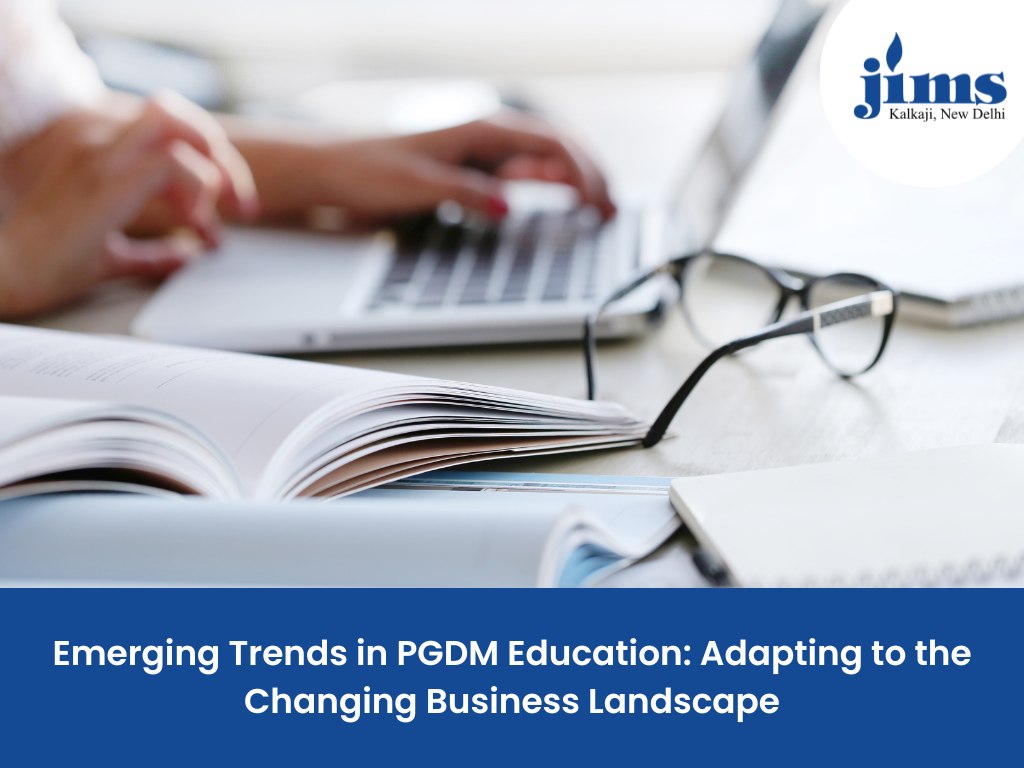Introduction
The business landscape is rapidly evolving, driven by technological advancements, globalization, and changing consumer preferences. In response to these transformative forces, Post Graduate Diploma in Management (PGDM) education is adapting and incorporating emerging trends to equip students with the skills and knowledge needed to excel in the dynamic business environment. In this blog, we at JIMS, Kalkaji, one amongst the best private MBA PGDM colleges in Delhi explores some of the key emerging trends in PGDM education and how institutions are preparing their students to navigate the evolving business world successfully.
-
Embracing Technology-Driven Learning
Technology has revolutionized the way we learn and access information. PGDM programs are increasingly integrating technology-driven learning approaches to provide a more immersive and engaging educational experience. Online learning platforms, interactive virtual classrooms, webinars, and mobile applications enable students to access course materials, participate in discussions, and collaborate with peers and faculty from anywhere in the world. Additionally, the use of simulations and gamification in teaching methodologies enhances experiential learning, fostering critical thinking and problem-solving skills.
-
Specializations Aligned with Industry Demands
As industries become more specialized and diverse, PGDM programs are offering an array of specialized courses to cater to the specific demands of the job market. Specializations in areas such as Business Analytics, Digital Marketing, Supply Chain Management, and Sustainability are gaining popularity. These specializations provide students with in-depth knowledge and expertise in niche fields, making them highly sought-after by employers seeking candidates with specialized skills to drive innovation and growth.
-
Focus on Experiential Learning
Experiential learning is a pedagogical approach that emphasizes hands-on experiences and real-world applications. PGDM programs are increasingly incorporating internships, industry projects, and live case studies to provide students with practical exposure to the challenges faced by businesses. This approach helps students bridge the gap between theory and practice, enhancing their problem-solving abilities and preparing them for the complexities of the real business world.
-
Global Exposure and Cross-Cultural Understanding
Globalization has interconnected businesses across borders, making cross-cultural understanding and international exposure essential for future business leaders. PGDM programs are offering international exchange programs, study tours, and collaborations with international universities to provide students with global exposure. Immersing in different cultures and experiencing diverse business practices not only broadens students’ perspectives but also fosters adaptability and open-mindedness, crucial traits in a globalized economy.
-
Integrating Ethics and Sustainability
In a world facing environmental and social challenges, businesses are increasingly expected to operate ethically and sustainably. PGDM programs are integrating courses on business ethics, corporate social responsibility (CSR), and sustainable practices. Students are encouraged to critically analyze the ethical implications of business decisions and understand the role of businesses in creating a sustainable future. By instilling these values, PGDM education fosters responsible leadership and creates socially conscious business professionals.
-
Nurturing Entrepreneurial Mindset
Entrepreneurship has become a driving force behind economic growth and innovation. PGDM programs are nurturing an entrepreneurial mindset by offering entrepreneurship-focused courses and providing support for aspiring entrepreneurs to develop their business ideas. Incubation centers, mentorship programs, and interaction with successful entrepreneurs enable students to explore their entrepreneurial potential and build the skills needed to launch and grow ventures successfully.
-
Soft Skills Development
While technical expertise is crucial, soft skills are equally essential for effective leadership and collaboration. PGDM programs are focusing on developing soft skills such as communication, teamwork, emotional intelligence, and leadership. Workshops, group discussions, and personality development programs help students build interpersonal skills that enhance their employability and professional growth.
Conclusion
In a rapidly changing business landscape, PGDM education must continually evolve to meet the demands of the industry and prepare students for the challenges ahead. By embracing technology, offering specialized courses, promoting experiential learning, providing global exposure, integrating ethics and sustainability, nurturing entrepreneurship, and focusing on soft skills development, PGDM programs equip students with the tools and knowledge needed to succeed in the dynamic world of business. We at JIMS, Kalkaji, ranked amongst the PGDM IB colleges in Delhi the business landscape continues to evolve, so will PGDM education, ensuring that the leaders of tomorrow are well-equipped to drive innovation, sustainability, and positive change.


It’s refreshing to read about how PGDM education is evolving in response to changes in the business world. Staying current and adaptable is so crucial in today’s fast-paced landscape. Excellent post!
This blog post does a great job at highlighting the need for flexibility and adaptability in PGDM education. As the business landscape keeps evolving, so should our education system.